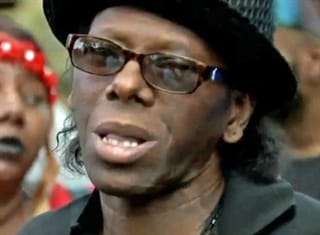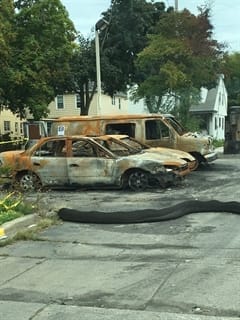An important step in working toward solutions for situations like Milwaukee’s would be to look honestly at the source of the unrest and rioting in the Sherman Park neighborhood. Not all of those participating have been doing it for the same reason.
Nationwide news coverage of the rioting in Milwaukee following the Aug. 13 death of 23-year-old Sylville Smith in a police confrontation has focused on the torched buildings, gunfire and scorched shells of cars. Yet the most important voice and powerful message amid this tragedy has largely been ignored. The young man’s father, Patrick Smith, in an anguished statement to local TV, declared:
“I had to blame myself for a lot of things, too, because your hero is your dad, and I played a very big part in my family’s role model for them. Being on the street, doing things of the street life: Entertaining, drug dealing and pimping and they’re looking at their dad like ‘he’s doing all these things.’ I got out of jail two months ago, but I’ve been going back and forth in jail, and they see these things. So I’d like to apologize to my kids because this is the role model they look up to. When they see the wrong role model, this is what you get.”
Had this father echoed the prevailing sentiments of the protests against police, he likely would have been championed and upheld as the poster figure of the demonstrations. Instead, Patrick Smith has been drowned out by so-called spokespersons, who may consider his comments to be off-message. In fact, this moving example of personal responsibility should serve as an example and a clarion call for a crucial moment of introspection.
An important step in working toward solutions for situations like Milwaukee’s would be to look honestly at the source of the unrest and rioting in the Sherman Park neighborhood. Not all of those participating have been doing it for the same reason.
The riots were not a spontaneous uprising of the general populace but were ignited by a group that capitalizes on volatile situations and whose focus is opportunist rather than the pursuit of justice. I call this group “riot shoppers,” and it is not surprising that a liquor store and an auto parts shop were among the first businesses to be looted and destroyed in this “protest for justice.”
The second cohort involved in the demonstrations consists of young people protesting against the inequalities and injustices they witness and the conditions of their community, which is suffering from high rates of unemployment, failing schools and concentrated poverty. The tragedy is that the authentic concern and passion of these youths and young adults that could power a search for and implementation of solutions has been diverted by the trap of an all-purpose villain: debilitating institutional racism, which has become the mantra of “spokespersons” and public officials of the black community.
Those who blame systemic racism for all the problems of the black community ignore the fact that many of the cities that have failed to educate their children and have left residents jobless and impoverished — setting the stage for rampant drug addiction and crime — have been controlled by black officials for decades. Perhaps now is the time to declare a moratorium on complaining about white racism and to take that time to confront the enemy within.
Fifty years ago, the trailblazers of the civil rights movement and the foot soldiers who risked their lives to engage in its mission believed that if legislation could be passed to establish voting rights, the election of blacks to positions of power and decision-making would improve conditions.
Today, the claim of the debilitating oppression of systemic racism is used as both a shield and a sword. It’s a shield from blame for the failure of those entrusted with power to fulfill their responsibility and the trust that had been placed in them. It’s a sword to attack a faceless external enemy that is presumed to determine the destiny of the black community.
This is nothing short of a black-authored version of white supremacy — an acceptance of impotence and victimhood, as if whites can somehow, by remote control, compel blacks to act against their own interests. The talking classes have two messages: You are not responsible, nor are we responsible. And law enforcement is viewed as an extension of institutional racism. The police are cast as today’s Bull Connor.
The Rev. Martin Luther King Jr. declared, “One of the sure signs of maturity is the ability to rise to the point of self-criticism.” What the black community needs today is a healthy dose of introspection. This is the example set by the father of Sylville Smith.
It is also the challenge posed by rappers Snoop Dogg and the Game, who called a cross-community Peace Summit in Los Angeles last month for “gang members, major figures & gang leaders from every hood in our city as well as the surrounding cities” to deal with the nationwide plague of black-on-black homicides.
The Game’s Instagram post before the July 17 meeting read, in part: “(We need) to have the much needed conversation amongst ourselves about our influence on the youth in our respective neighborhoods & how we can serve as better role models to them & the brothers we stand beside daily … Because the sad truth that no one wants to face is, before we can get OUR LIVES TO MATTER to anyone else … We have to show that OUR LIVES MATTER to US!!!!”
While, sadly, it is too late for Sylville Smith, it is not too late for Patrick Smith to have a second chance, and it is not too late for him to serve as an example that can bring a second chance to the lives of other fathers and sons across the nation who are trapped in the same self-destructive cycle. Rather than being ignored, dismissed and drowned out by the usual voices of protest, Patrick Smith should be recognized, and his potential as a leader should be acknowledged and strengthened.
Sources of support for Patrick Smith and those who resonate with his message exist in communities throughout the nation where neighborhood leaders are not waiting angrily for some systemic change but are empowering others to reclaim their lives, revitalize their families and rebuild their communities, even in the face of oppressive odds.
Among these is a Las Vegas-based re-entry program, Hope for Prisoners. The program was virtually started in a broom closet in 2009 by Jon Ponder, a man with vision and passion who knew firsthand the challenges that confront former inmates upon release. (The Wisconsin Policy Research Institute will profile Hope for Prisoners in the coming weeks.) Since its founding, the program has changed the lives of 1,500 former inmates through a network composed of members of churches, communities and law enforcement, which has provided mentorship and assistance in employment, housing and personal development.
Once the focus has moved from blame to solutions, crucial resources and support can be invested in expanding the reach of such oases of health and maximizing the impact of their example. And the target of reform will be lawlessness, wherever it occurs and whoever its perpetrators may be.
Robert L. Woodson Sr. is the founder and president of the Center for Neighborhood Enterprise, based in Washington, D.C. Woodson has been active in Milwaukee for more than two decades, training dozens of poverty-fighting groups. This column expresses his personal opinion.






